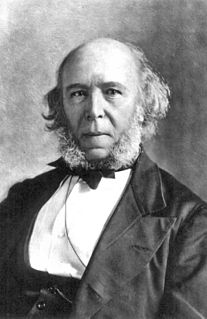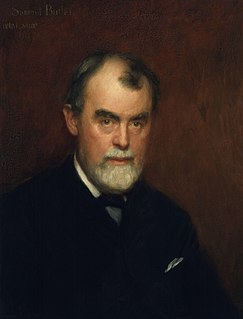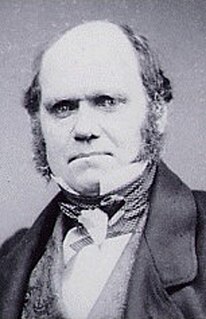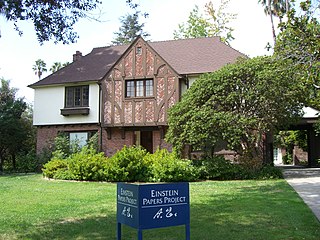Related Research Articles

On the Origin of Species, published on 24 November 1859, is a work of scientific literature by Charles Darwin that is considered to be the foundation of evolutionary biology. Darwin's book introduced the scientific theory that populations evolve over the course of generations through a process of natural selection. The book presented a body of evidence that the diversity of life arose by common descent through a branching pattern of evolution. Darwin included evidence that he had collected on the Beagle expedition in the 1830s and his subsequent findings from research, correspondence, and experimentation.

Herbert Spencer was an English philosopher, biologist, anthropologist, and sociologist famous for his hypothesis of social Darwinism whereby superior physical force shapes history. Spencer originated the expression "survival of the fittest", which he coined in Principles of Biology (1864) after reading Charles Darwin's On the Origin of Species. The term strongly suggests natural selection, yet Spencer saw evolution as extending into realms of sociology and ethics, so he also supported Lamarckism.

The Voyage of the Beagle is the title most commonly given to the book written by Charles Darwin and published in 1839 as his Journal and Remarks, bringing him considerable fame and respect. This was the third volume of The Narrative of the Voyages of H.M. Ships Adventure and Beagle, the other volumes of which were written or edited by the commanders of the ships. Journal and Remarks covers Darwin's part in the second survey expedition of the ship HMS Beagle. Due to the popularity of Darwin's account, the publisher reissued it later in 1839 as Darwin's Journal of Researches, and the revised second edition published in 1845 used this title. A republication of the book in 1905 introduced the title The Voyage of the "Beagle", by which it is now best known.

Samuel Butler was an English novelist and critic. He is best known for the satirical utopian novel Erewhon (1872) and the semi-autobiographical The Way of All Flesh, published posthumously in 1903. Both have remained in print ever since. In other studies he examined Christian orthodoxy, evolutionary thought, and Italian art, and made prose translations of the Iliad and Odyssey that are still consulted today.

Ernest Hartley Coleridge (1846–1920) was a British literary scholar and poet. He was son of Derwent Coleridge and grandson of Samuel Taylor Coleridge.

The Autobiography of Mark Twain is a lengthy set of reminiscences, dictated, for the most part, in the last few years of the life of American author Mark Twain (1835–1910) and left in typescript and manuscript at his death. The Autobiography comprises a rambling collection of anecdotes and ruminations rather than a conventional autobiography. Twain never compiled these writings and dictations into a publishable form in his lifetime. Despite indications from Twain that he did not want his autobiography to be published for a century, he serialised some Chapters from My Autobiography during his lifetime and various compilations were published during the 20th century. However it was not until 2010 that the first volume of a comprehensive collection, compiled and edited by The Mark Twain Project of the Bancroft Library at University of California, Berkeley, was published.
The inception of Darwin's theory occurred during an intensively busy period which began when Charles Darwin returned from the survey voyage of the Beagle, with his reputation as a fossil collector and geologist already established. He was given an allowance from his father to become a gentleman naturalist rather than a clergyman, and his first tasks were to find suitable experts to describe his collections, write out his Journal and Remarks, and present papers on his findings to the Geological Society of London.

The British naturalist Charles Darwin corresponded with his extended family and with an extraordinarily wide range of people from all over the world. The letters, over 15,000 in all, provide many insights on issues ranging from the origins of key scientific concepts, to religious and philosophical discussions which have continued to the present day. The letters also illuminate many aspects of Darwin and his biography: the development of his ideas; insights into character and health; and private opinions on controversial issues. His letters to the Harvard botanist Asa Gray, for example, show his opinions on slavery and the American Civil War. Darwin relied upon correspondence for much of his scientific work, and also used letters to marshal support for his ideas amongst friends and colleagues. The historian of science Janet Browne has argued that Darwin's ability to correspond daily played a crucial role in the development of his theory and his ability to garner support for it from colleagues.
The Life and Letters of Charles Darwin is a book published in 1887 edited by Francis Darwin about his father Charles Darwin. It contains a selection of 87 letters from the correspondence of Charles Darwin, an autobiographical chapter written by Charles Darwin for his family, and an essay by Thomas Huxley "On the reception of the 'Origin of Species'".
More Letters of Charles Darwin, a sequel to The Life and Letters of Charles Darwin of 1887, was a book in two volumes, published in 1903, edited by Francis Darwin and Albert Seward, containing as the title implies, additional publications of 782 letters from the correspondence of Charles Darwin.

The Ellen G. White Estate, Incorporated, or simply the (Ellen) White Estate, is an organization created in 1933 by the five trustees named in Ellen G. White's last will and testament to act as the custodian of her writings, which Seventh-day Adventists consider as divinely inspired. The headquarters is located at the General Conference in Silver Spring, Maryland, where it functions as a quasi-independent department of the denomination. It has an independent and self-perpetuating board, but the organization receives an annual allocation just like other departments of the world headquarters. The White Estate has branch offices and research centers at Adventist universities and colleges around the world with at least one center in each division of the world church.

The Einstein Papers Project (EPP) produces the historical edition of the writings and correspondence of Albert Einstein. The EPP collects, transcribes, translates, annotates, and publishes materials from Einstein's literary estate and a multitude of other repositories, which hold Einstein-related historical sources. The staff of the project is an international collaborative group of scholars, editors, researchers, and administrators working on the ongoing authoritative edition, The Collected Papers of Albert Einstein (CPAE).
This is a partial list of the writings of Charles Darwin, including his main works.

The Complete Work of Charles Darwin Online is a freely-accessible website containing the complete print and manuscript works of Charles Darwin, as well as related supplementary material.
John van Wyhe is a British historian of science, with a focus on Charles Darwin and Alfred Russel Wallace, at the National University of Singapore. He holds various academic and research positions, ranging from founder and director of The Complete Works of Charles Darwin Online, Scientific Associate, The Natural History Museum (London), a Fellow of the Linnean Society and a Member of the British Society for the History of Science. He has given more than 50 public lectures on Darwin in more than a dozen countries. He lectures and broadcasts on Darwin, evolution, science and religion and the history of science around the world. He also wrote The Darwin Experience, a biographical book about Charles Darwin.

The Variation of Animals and Plants under Domestication is a book by Charles Darwin that was first published in January 1868.
The Papers of James Madison project was established in 1956 to collect and publish in a comprehensive letterpress edition the correspondence and other writings of James Madison, the Virginia statesman best remembered for his public service as "Father of the Constitution" and fourth president of the United States.

Richard Broke Freeman was a zoologist, historian of zoology, bibliographer of natural history and book collector. Known professionally as R. B. Freeman, he compiled comprehensive reference works on Charles Darwin and on P. H. Gosse. He was “a meticulous scholar” and a “brilliant bibliographer” who showed “a genuine modesty about his great erudition.” "It is darkly rumored among antiquarian booksellers that R. B. Freeman once missed a completely unrecorded and absurdly rare 1859 second issue of the first edition of The Origin of Species", a reviewer wrote in the Times Literary Supplement, "but this is also said to be the only mistake he has made during a lifetime of persistent scholarship and imaginative detective work in libraries, bookshops, sale-rooms, the attics of country houses and the trunks of the great-aunts of great men."

Die Marx-Engels-Gesamtausgabe (MEGA) is the largest collection of the writing of Karl Marx and Friedrich Engels in any language. It is an ongoing project intended to produce a critical edition of the complete works of Marx and Engels that reproduces the extant writings of both authors in books of high-quality paper and library binding.
The Papers of Thomas Jefferson is a multi-volume scholarly edition devoted to the publication of the public and private papers of Thomas Jefferson, the third President of the United States. The project, established at Princeton University, is the definitive edition of documents written by or to Jefferson. Work on the series began in 1944 and was undertaken solely at Princeton until 1998, when responsibility for editing documents from Jefferson's post-presidential retirement years, 1809 until 1826, shifted to the Thomas Jefferson Foundation at Monticello. This enabled work to progress simultaneously on two different periods of Jefferson's life and thereby doubled the production of volumes without compromising the high standards set for the project.
References
- Maura C. Flannery, "The Darwin Industry", The American Biology Teacher , Vol. 68, No. 3 (March 2006), pp. 163–166
- Michael Ruse, "The Darwin Industry: A Guide", Victorian Studies , Vol. 39, No. 2 (Winter, 1996), pp. 217–235
- Timothy Lenoir, "Essay Review: The Darwin Industry", Journal of the History of Biology , Vol. 20, No. 1 (March 1987), pp. 115–130
- David Oldroyd ; Michael Ruse; Paul Pearson; and Sandra Herbert, "Review Symposium: Darwin's Geology: The End of the Darwin Industry?", Metascience, Vol. 16, No. 1 (April 2007), pp. 25–50, doi : 10.1007/s11016-006-9069-2.